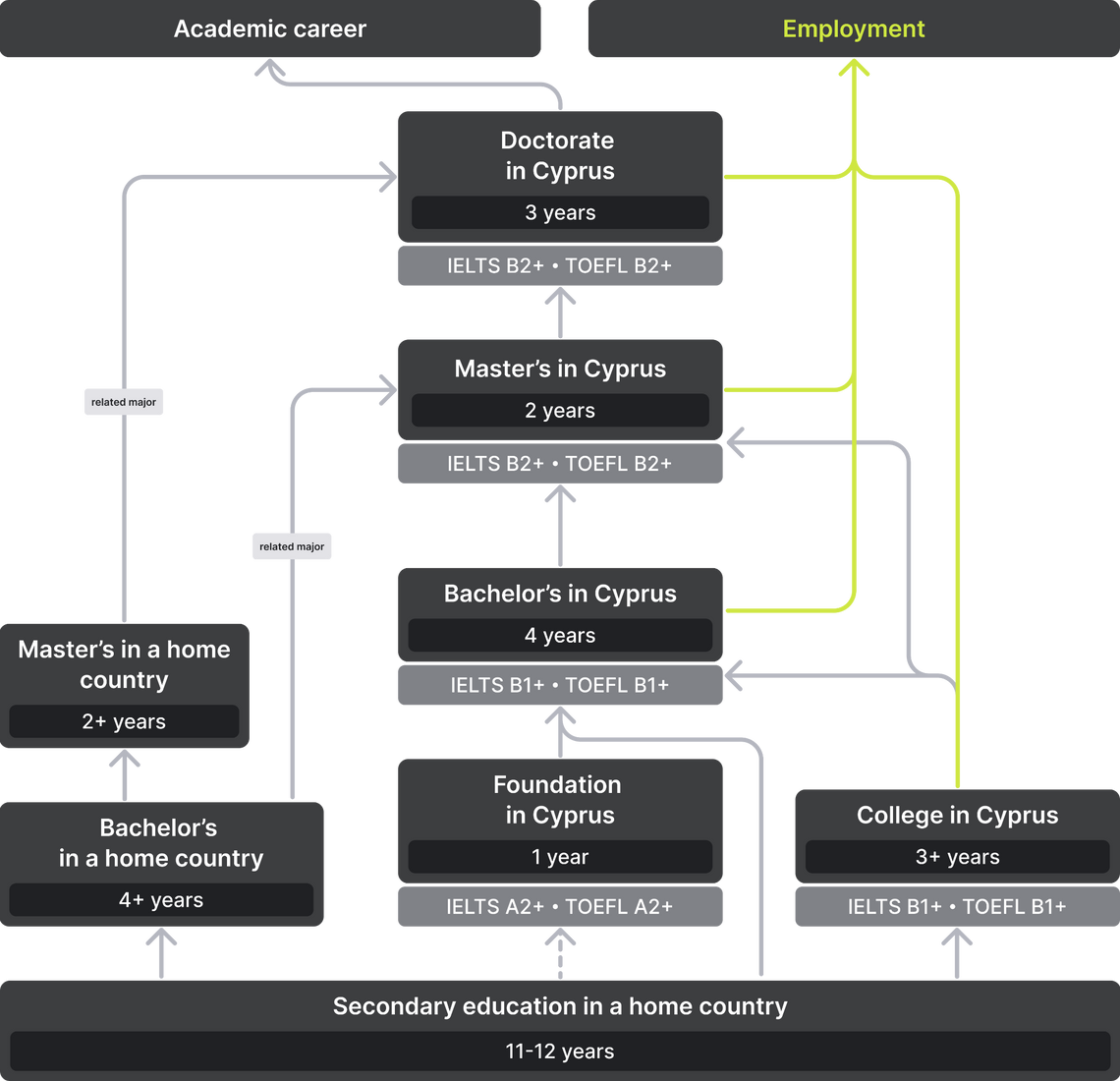
Apply to a foreign university with confidence
- Properly fulfilled documents
- Perfect motivation letter
- Support from a personal mentor
- Offers from several universities
Article score: 5 out of 5 (1 review)
Education in Cyprus is based on the British model. Studying in English here is much cheaper than in England. Read what else is special about education in Cyprus, how much it costs and how to admit.
Free consultation



Preschool education in Cyprus is compulsory and begins at the age of 4-5. At the age of 6, students move to primary school, which lasts 6 years and is formally divided into two stages: grades 1-3 — basic skills (counting, reading, writing), grades 4-6 — foreign languages, humanities, music. The last compulsory stage of secondary education is 3 years of secondary school (Gymnasio), where general education subjects are studied in-depth.
After the 9th grade, children can choose between two options:
In addition to public and free, there are also private secondary schools in Cyprus. Among them are institutions with American, English, and other training programs. There you can also take a preparatory program for admission to US universities (Freshman). Studying at such schools will cost 10,000-15,000 USD per year on average.
Education in Cyprus receives large subsidies from the state: the country spends more than 6% of its GDP[1] on education, which is higher than the average in the European Union. Thanks to this, the quality of education improves and not only local but also foreign students from Europe and the USA are increasingly choosing to study in Cyprus. Moreover, here you can get education of the generally recognized British standard for much cheaper than in the UK itself while enjoying the mild Mediterranean climate.
Attention! The island of Cyprus is formally divided into two states: the Republic of Cyprus and the Turkish Republic of Northern Cyprus (TRNC). The latter is recognized only by Turkey, although several large universities successfully operate on its territory. This article will focus on education in the Republic of Cyprus unless otherwise indicated. Requirements and standards in TRNC universities may differ from those described in the article.
| Type of study | Age | Duration | Min. cost | Avg. cost | Language requirements |
|---|---|---|---|---|---|
| Summer camp | 6+ | 1-12 weeks. | 452 USD/week | 1,130 USD/week | A1 |
| Language schools | 6+ | 1-16 weeks | 339 USD/week | 565 USD/week | A1 |
| Secondary education | 6+ | 12 years | Free | 13,560 USD/year | B1 |
| Foundation | 16+ | 1 year | 5,650 USD/year | 6,780 USD/year | IELTS 4.0 |
| Bachelor's | 17+ | 4 years | 6,780 USD/year | 10,170 USD/year | IELTS 5.5 |
| Master's | 20+ | 1-2 years | 6,780 USD/year | 9,040 USD/year | IELTS 5.5 |
| MBA | 20+ | 1–2 years | 7,910 USD/year | 13,560 USD/year | IELTS 5.5 |
| Doctoral | 20+ | 3 years | 4,520 USD/year | 7,910 USD/year | IELTS 5.5 |
| Item | Average cost |
| Language examination (IELTS) | ~226 USD |
| Student visa | 159 USD |
| Registration fee | 113 USD |
| Flight tickets | 141-1,130 USD |
| Rent | 339 USD/month |
| Commute | 23 USD/month |
| Meals | 203 USD/month |
| Study materials | 452 USD/year |
| Insurance | 192 USD/year |


Until the middle of the 20th century, Cyprus was a colony of Great Britain, so the traditions of British education were preserved there. For admission to a university in the Republic of Cyprus or the Turkish Republic of Northern Cyprus (TRNC), it is not necessary to speak Greek or Turkish. Most universities and institutes offer English-language programs. At the same time, the requirements for the level of proficiency are low and start from B1. A certificate is also not always required. Many universities conduct their own language tests as a part of the admission process. If the applicant speaks Greek or Turkish, he can also take an entrance test.
In general, the process of admission to universities in Cyprus is not that difficult. Most universities divide the academic year into 2 or 3 semesters (A, B, and C). You can start training during any of them, not only in September.
At the first stage of the admission process, universities require you to fill out a digital application and attach the following documents to it:
For diplomas issued by some countries, it is important to have an apostille or consular legalization. All documents must be translated into English. In the event of the admissions office having questions or additional requirements, a representative of the faculty will contact the student via email.
A characteristic requirement of the Republic of Cyprus is the mandatory testing for AIDS, syphilis, tuberculosis, and hepatitis B and C. All tests are done twice: once before applying for a visa and again upon arrival in the country.
In general, applicants from countries outside the EU will need to apostille their diploma or undergo consular legalization. However, in case Cyprus and your home country have an agreement on mutual recognition of qualifications, you will just need to provide a certificate of previous education with a translation.
In some cases, it will be also necessary to go through the recognition procedure. Validating diplomas is especially common for graduates of medical universities who want to work in Cyprus. This is the responsibility of The Cyprus Council of Recognition of Higher Education Qualifications KYSATS. The equivalence of a diploma is established not according to the academic degree or specialty stated in the document, but according to the number of hours and the presence of certain disciplines in the training program. If there is a strong discrepancy with the standards of Cyprus, the future doctor will have to confirm his qualifications and pass specialized exams. Such a need may also arise if a student graduated from an unpopular university, with which KYSATS experts have not yet worked. Exams are held in Greece, Athens. An additional difficulty is that the testing is done in Greek only.

Normally foreigners go to Cyprus to receive a British-like education in English, therefore, the knowledge of English is required for admission. Entrance requirements in most universities are low and start at IELTS 5.5. Many universities also conduct their own language proficiency tests prior to the start of the academic year in order to assign applicants to groups. If the student's level of proficiency is too low, he can take a one-year language training program (Foundation English) at a university or a college, so that in the future it will be easier for him to study. However, this procedure is optional and also expensive. You can enroll in the first year and include English in your schedule to improve your language during your studies.
There are also Foundation programs in Cyprus for those who want to go to universities in the UK or their branches in Cyprus and other European countries. During the year, students of such programs study specialized English in their professional field and get acquainted with British teaching standards. Applicants must provide certificates IELTS (at least 4.0) and IGCSE (grade 6).
Colleges in Cyprus can be independent educational institutions or affiliated with a university. There are both public and private colleges. The latter are more often available to foreigners: more courses are taught in English than in the official language of the country — Greek. You can enter a college after high school and receive one of the following degrees, depending on the length of study: Certificate (1 year), Diploma (2 years), Higher Diploma (3 years), or Bachelor (4 years). After the Bachelor’s, the training continues at the master's cycle already at the university. The main condition for admission to college for a foreigner is English proficiency at a level not lower than B1. If the applicant does not have a language certificate (IELTS or TOEFL), colleges can offer admission testing. For 1–3 years, students receive secondary vocational education, and then they can immediately start working or enter the university for a bachelor's degree. The most in-demand specialties are hospitality, tourism, and culinary arts, which is not surprising, considering that Cyprus is a popular resort.
Cyprus and its northern part (Turkish Republic of Northern Cyprus) also have colleges of American standard, where a 2-year associate degree can be obtained — AA (Associate In Arts) or AS (Associate in Science).

Education in Cyprus is based on the Bologna system, where the first cycle is the Bachelor's degree. It lasts for 4 years, during which the student must earn 240 ECTS.
Cyprus universities follow the standards of the US and the UK, allowing students to choose most of the subjects themselves. However, each program has rules for the distribution of workload in ECTS: multiple compulsory subjects, elective courses from your department, and electives in any area. The percentage depends on the university and the specialty. Many universities require English courses and sports disciplines. Also, all students write their thesis and defend it in front of the commission at the end of the final year of studies.
All documents must be translated into English.
Master’s programs in Cyprus last for 1-2 years, more often — 18 months. As in bachelor’s programs, the workload is 30 ECTS per semester. Credits are distributed among different types of disciplines: compulsory courses, electives, and master's thesis. The latter is defended by students in front of the commission. Many faculties additionally organize practical training and internships for bachelor’s students.
A prerequisite for admission to a master's is a bachelor's degree in the same or related specialty. The admissions committee usually takes the GPA of the applicant for the period of previous education into account. The strongest areas of master’s studies in Cyprus are management, finance, international relations, and engineering.
Some universities may provide master’s students with a discount if they successfully completed a bachelor's degree of the same institution. As far as MBA programs are concerned, in Cyprus, they compare favorably when it comes to the price and GMAT score requirements.
All documents must be translated into English.

Obtaining a PhD in Cyprus will take a minimum of 3 years. A student can extend the studies if extra time is needed to finish a doctoral dissertation, but the maximum duration of PhD studies cannot exceed 8 years. During the doctoral studies, you must gain 180 ECTS. The work on the dissertation has a major impact on credits, but in addition, the student must study several compulsory disciplines in his field, pass final exams on them and publish several articles related to the topic of the conducted research.
For admission, you must provide a Research proposal and a portfolio (scientific papers, publications, etc.). Grades from bachelor's and master's studies are taken into account. The second stage after reviewing the documents is the interview.
Doctoral programs are offered by all public universities and most private ones. There are also colleges that specialize in PhD programs in a specific field. At this stage, students wishing to build an academic career can already start teaching.
All documents must be translated into English.
Academic positions in Cyprus copy the American system. Traditionally, the academic career has the following steps:
All higher education in Cyprus is paid. Prices for third-country nationals are an order of magnitude higher than for Cypriots and immigrants from the EU. However, most universities, public and private, offer students financial support. More often this opportunity is offered to bachelor’s students. In order to view detailed descriptions of grants and scholarships, go to the Scholarship and/or Financial Aid section on the website of the selected university. Applications for financial assistance are submitted along with other documents for admission, in March — for the fall semester and in November — for the spring semester accordingly.
As a rule, a foreign applicant in Cyprus has two reasons for receiving a scholarship:
Also, some universities provide scholarships for students who have distinguished themselves in sports. They can get a discount of up to 40% by becoming members of the sports team at their university.

EU students don't need a visa to study in Cyprus. However, they should obtain a temporary residence permit by applying to the Civil Registry and Migration Department.
Foreign students from countries outside of the European Union must obtain a visa to enter Cyprus. It is issued only to those who plan to study full-time which means that they will have a training load of at least 12 ECTS per semester. You can apply for a visa if you have a letter of admission from the university. As a rule, the university asks the applicant to send the necessary documents via mail, and then the employee of the international office independently redirects them to the Migration Department. If there is no such service, you should contact the Cyprus Embassy in your country.
All documents must have a notarized translation into English. Applicants from third countries will additionally need to legalize documents of previous education with the help of apostille or consular legalization (except for the countries which have mutual agreements).
After approval of the documents, the Cyprus Migration Department sends the student an entry visa scan (blue slip) via email. In addition to a visa and passport, the following documents will be required at the airport:
Within 10 days after arrival to Cyprus, you must change the entry visa for a Temporary Residence Permit Card. To do this, you must first retake the medical tests and do a photofluorography. It will cost about 56 USD. Then the student must contact the Department of Migration, prove their solvency and pay a fee of 40 USD. As a rule, a representative of the host university helps at all stages. A temporary residence permit is renewed once a year. Read more about this procedure here.
Important: if the university is located on the territory of the Turkish Republic of Northern Cyprus (TRNC), you might encounter a variety of issues. A student visa is issued upon arrival at the university. If your passport has stamps on entering the TRNC (they can be put on a separate form), entering the southern part of the island will be problematic even with a separate visa of the Republic of Cyprus. It is also possible to get into the stop list of the EU countries since the TRNC is an unrecognized territory for the whole world except Turkey.
Students gain the right to work 6 months after arriving in the country, that is from the second semester. With a work permit, a student at a recognized university can work up to 20 hours a week for a semester and up to 38 hours a week during study breaks. If you are an EU student, you are allowed to work without a work permit. If you are a non-EU student you must apply for a work permit through the university or independently at the Ministry of Labor and Social Insurance.
In general, it is rather difficult for a foreign student to find work in Cyprus. Work is allowed only in certain sectors and positions. This is mainly hotel business and agriculture. A full list of permitted jobs can be found here. Traditionally, in the summer season, there is a huge demand for temporary workers in the tourism industry with the knowledge of the English language. On average, students can earn 565-678 USD per month for part-time work.

None-EU foreign students must leave Cyprus within 60 days after the graduation ceremony and the conclusion of studies. However, if a graduate has received a job offer in an industry where there is no high competition among Cypriots, he can obtain a category E work visa. It must be renewed once a year throughout the duration of the work contract, but not longer than 5 years. The cost of a work visa is 565 USD, each renewal is about 23 USD. A list of required documents for all types of work visas can be found on the website of the Department of Migration.
Graduates from universities in Northern Cyprus can also get work permits if they are offered a contract. In most cases, the employer submits the visa documents on your behalf. Many TRNC universities have special career centers that select suitable vacancies for students and are interested in keeping students working in the northern part of the island. The competition is significantly lower than in the Republic of Cyprus, as local residents leave for Turkey, where they find full-time work on a par with citizens.
60+ countries
we work with
$1,000,000 saved
by students through scholarships
6,400 offers
our students got